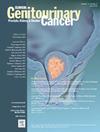Prospective Study of Patient, Nursing, and Oncology Provider Perspectives on Telemedicine Visits for Renal Cell Carcinoma Clinical Trials
IF 2.3
3区 医学
Q3 ONCOLOGY
引用次数: 0
Abstract
Purpose
Clinical trials enable renal cell carcinoma (RCC) patients to receive promising investigational agents, yet access may be limited. Telemedicine (TM) is an increasingly utilized platform that can expand access, but perspectives on its use in clinical trial care are unknown.
Patients and Methods
A prospective study was conducted between Jan 2023 – Oct 2023 at Memorial Sloan Kettering Cancer Center. RCC patients enrolled on therapeutic clinical trials who had prior TM visits were eligible. Surveys in English were distributed to patients, treating clinical trial nurses (CTNs), and oncology providers engaged in clinical trials.
Results
39 patients, 7 CTNs, and 15 oncology providers were included in our analysis. Regarding clinical trial care, 26 patients (67%) preferred in-person, 4 (11%) preferred TM, and 9 (22%) had no preference. However, 25 patients (64%) reported TM provided an equal quality of care, and 38 (97%) reported a positive or neutral experience. Conversely, 7 CTNs (100%) and 11 providers (73%) preferred in-person care while 4 (27%) indicated no preference. Most, including 6 CTNs (86%) and 13 providers (87%), reported that TM quality of care was inferior. However, most, including 7 CTNs (100%) and 14 providers (93%), reported a positive experience with TM.
Conclusions
In this study, one third of RCC participants preferred TM or had no preference, and a majority felt TM delivered equal quality of care. Providers, however, preferred in-person visits and reported inferior quality of care with TM. These findings warrant further evaluation of safety and feasibility to optimize TM integration for clinical trial care delivery.
肾细胞癌临床试验中远程医疗访问的患者、护理和肿瘤提供者观点的前瞻性研究
临床试验使肾细胞癌(RCC)患者能够接受有希望的研究药物,但准入可能受到限制。远程医疗(TM)是一个越来越多的利用平台,可以扩大访问,但其在临床试验护理中的应用前景尚不清楚。患者和方法一项前瞻性研究于2023年1月至2023年10月在纪念斯隆凯特琳癌症中心进行。参加治疗性临床试验的RCC患者均有TM就诊史。英文调查问卷分发给患者、临床试验护理护士(ctn)和从事临床试验的肿瘤学提供者。结果39名患者、7名ctn和15名肿瘤提供者被纳入我们的分析。在临床试验护理方面,26例(67%)患者倾向于面对面护理,4例(11%)患者倾向于TM, 9例(22%)患者无偏好。然而,25名患者(64%)报告TM提供了相同的护理质量,38名患者(97%)报告了积极或中性的体验。相反,7名ctn(100%)和11名提供者(73%)倾向于亲自护理,而4名(27%)表示没有偏好。大多数,包括6名ctn(86%)和13名提供者(87%),报告TM护理质量较差。然而,大多数人,包括7名ctn(100%)和14名提供者(93%),报告了对TM的积极体验。结论在本研究中,三分之一的RCC参与者倾向于TM或没有偏好,大多数人认为TM提供了同等质量的护理。然而,提供者更倾向于亲自就诊,并报告TM的护理质量较差。这些发现为进一步评估将TM整合到临床试验中的安全性和可行性提供了依据。
本文章由计算机程序翻译,如有差异,请以英文原文为准。
求助全文
约1分钟内获得全文
求助全文
来源期刊

Clinical genitourinary cancer
医学-泌尿学与肾脏学
CiteScore
5.20
自引率
6.20%
发文量
201
审稿时长
54 days
期刊介绍:
Clinical Genitourinary Cancer is a peer-reviewed journal that publishes original articles describing various aspects of clinical and translational research in genitourinary cancers. Clinical Genitourinary Cancer is devoted to articles on detection, diagnosis, prevention, and treatment of genitourinary cancers. The main emphasis is on recent scientific developments in all areas related to genitourinary malignancies. Specific areas of interest include clinical research and mechanistic approaches; drug sensitivity and resistance; gene and antisense therapy; pathology, markers, and prognostic indicators; chemoprevention strategies; multimodality therapy; and integration of various approaches.
 求助内容:
求助内容: 应助结果提醒方式:
应助结果提醒方式:


